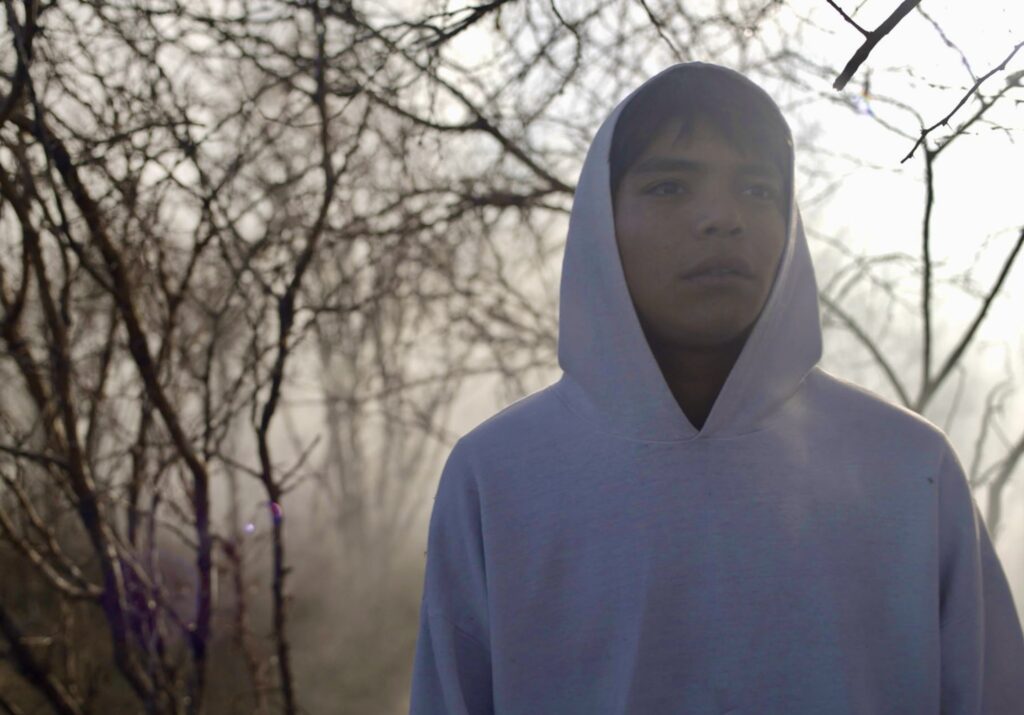
(***)
Crime kills. Crime kills dads. Dead dads leave sons behind. Sons suffer. Sons have to find their way out of the dark.
The easier story for writer/directors Astrid Rondero and Fernanda Valadez to tell about the horrors of Mexico’s violent cartels is one that’s a shoot ‘em up with plenty of bullets and bodies. Wisely, like this assignment came from heaven, instead they chose to spin a parable about a four-year-old boy name Sujo (Kevin Aguilar) left orphaned by a bad guy dad, who’s gunned down by another bad guy. Out in the country where they live, criminals are often called numbers. The lower the number, the fiercer that man. Sujo’s papi was named Eight. He had plenty of blood on his hands.
After an initial flurry of killings and death, there’s little flash and action in what audiences will watch for the next 2h 6m. The pacing isn’t fast, the emotions aren’t extreme, the drama isn’t over-the-top in ways you might expect. Sometimes crises are depicted in a subtle manner.
In one tense scene, a gunman hunts and tracks the boy to his aunt Nemesia’s (Yadira Pérez) home. Before she lets the devil enter her house, she tells little Sujo to hide under a table, pulling a tablecloth down around him as a shroud. The camera (cinematographer Ximena Amann) follows the boots of the killer, as he questions the aunt. She lies. Swears her nephew is gone. The hitman lurks. The boy is terrified. He doesn’t scream or cry. Instead, a puddle of liquid circles arounds him. He’s pissed on himself. That understated act shows paralyzing fear in a far more thoughtful and expressive way than shrieks or sobbing. It’s genius.
That artistic restraint becomes the style in which the story unfolds. Years later, Sujo (Juan Jesús Varela) is an adolescent living a secret life in plain sight, but away from town. He’s surrounded and befriended by his similar-aged cousins Jeremy (Jairo Hernandez) and Jai (Alexis Varela), their mom Rosalia (Karla Garrido) and Nemesia. Danger is never far away. Isolation is a key to survival. Rosalia: “How long will you keep him hidden.” Nemesia: “As long as it takes them to forget.”
A car Sujo’s dad once owned has been left behind in a field. It’s a relic. A memento. Over the years, as Sujo grew into a teenager, it’s been covered in weeds and seemingly inoperable. For a while, it’s a mystery why this prop was written into the script. Turns out its purpose is to kickstart the second act and puts the boys in motion as they careen down dirt roads and test their limits. That leads to a third act, where Sujo’s voyage of self-discovery continues, and he must make a choice—advance or regress.
At the 38-minute mark the pacing dies down. The thrills are few, the suspense too. The drama with moms and kids is fine but that’s not what the first scenes portended. It will take patience for audiences to stick with the plotting as points are made, lives come and go, and opportunities reveal themselves. Viewers will have to decide if a methodically paced fable about a boy stepping out of the dark is worth their attention.
There are moments that don’t seem purposeful, and these instances will make some wish the editing was tighter, the scenes more compact and the rhythm had a faster beat. Take a breath, let this old-fashioned kind of filmmaking work its magic. Enjoy the view, as the cinematography catches the right angles, presents perfect composition and sets the atmosphere. Watch the struggle. Watch these women, expertly interpreted by Pérez and Garrido, try to make sure their boys live past sundown. Stick with Sujo, who’s beguilingly played by Aguilar and Varela, as he finds his direction.
Let this allegory about violence, sorrow and hope wash over you. It will take time. This isn’t a drive by. It’s an ode to those left behind. Those whose story is never told. Until now.
Photos courtesy of the Sundance Film Festival
For more information about the Sundance Film Festival go to: https://festival.sundance.org
Visit Film Critic Dwight Brown at DwightBrownInk.com.